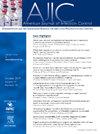感染预防专家当前和首选的培训策略和工具。
IF 2.4
3区 医学
Q2 INFECTIOUS DISEASES
引用次数: 0
摘要
背景:对医护人员进行感染预防与控制(IPC)教育是感染预防专家(IP)的一项重要职责,但 COVID-19 大流行分散了 IPC 教育的资源。本研究的目的是对当前的 IPC 培训需求进行评估:方法:邀请感染控制和流行病学专业人员协会会员于 2023 年 5 月至 6 月完成一项在线调查,以评估他们当前和首选的 IPC 医护人员培训方法和工具。供应商、退休人员、APIC 工作人员或不在医疗机构或公共卫生机构工作的人员均被排除在外:结果:共有 2,432 名综合方案参与者参与。与计划中的教育活动(即学习模块、正式演讲、培训师培训或模拟;KW=288,P 讨论)相比,IPs 更倾向于报告他们参与了即兴医护人员培训(即即时教学和团队聚会):IP将模拟教学列为首选教学方法,但模拟教学是最不常用的方法之一。IP教育应包括提供有效即兴培训的策略,以及如何开发和实施互动模拟教学:结论:在开发 IPC 相关教学和培训工具时,应考虑 IP 人员表达的需求和偏好。本文章由计算机程序翻译,如有差异,请以英文原文为准。
Infection preventionists’ current and preferred training strategies and tools
Background
Educating health care staff on infection prevention and control (IPC) is an essential role of infection preventionists (IPs), but the COVID-19 pandemic diverted resources away from IPC education.
Methods
Association for Professionals in Infection Control and Epidemiology members were invited to complete an online survey from spring 2023 to assess current and preferred approaches and tools for training health care personnel on IPC. Vendors, retirees, APIC staff, or those not working in health care or public health were excluded.
Results
In all, 2,432 IPs participated. IPs were more likely to report engaging in impromptu health care worker training (ie, just-in-time teaching and team huddles) versus planned educational activities (ie, learning modules, formal presentations, train-the-trainer, or simulation; Kruskal-Wallis = 288, P < .001). IPs’ top preferred teaching methodologies included simulation or interactive activity, and their lowest preferred approach was independent learning modules. IPC training apps were frequently requested technology.
Discussion
IPs ranked simulation as their top preferred teaching method; however, simulation was one of the least frequently used approaches. IP education should include strategies for delivering effective impromptu training and how to develop and implement interactive simulation-based education.
Conclusions
The expressed needs and preferences of IPs should be considered when developing IPC-related teaching and training tools.
求助全文
通过发布文献求助,成功后即可免费获取论文全文。
去求助
来源期刊
CiteScore
7.40
自引率
4.10%
发文量
479
审稿时长
24 days
期刊介绍:
AJIC covers key topics and issues in infection control and epidemiology. Infection control professionals, including physicians, nurses, and epidemiologists, rely on AJIC for peer-reviewed articles covering clinical topics as well as original research. As the official publication of the Association for Professionals in Infection Control and Epidemiology (APIC)

 求助内容:
求助内容: 应助结果提醒方式:
应助结果提醒方式:


